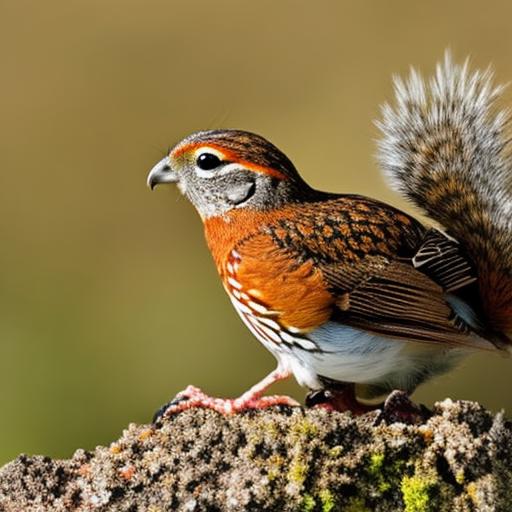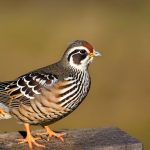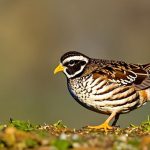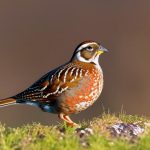Squirrels and quail can be a nuisance for many homeowners and gardeners. These small animals are known for their ability to dig up gardens, steal birdseed, and cause damage to property. Squirrels are particularly notorious for their ability to access bird feeders and steal the seeds meant for birds. This can be frustrating for those who enjoy birdwatching and want to attract birds to their yard. Additionally, quail can also cause damage to gardens by digging up plants and creating nests in inconvenient locations. Both squirrels and quail can be persistent and difficult to deter, making it important to find effective solutions to keep them at bay.
Squirrels and quail are attracted to yards and gardens for a variety of reasons. They are often drawn to bird feeders, gardens, and yards with abundant food sources. Additionally, they may be seeking shelter or nesting sites in the area. Understanding the reasons why these animals are attracted to your property is the first step in finding effective solutions to keep them away. By addressing the root causes of their presence, you can implement strategies to deter them and protect your property.
Key Takeaways
- Squirrels and quail can block bird feeders, causing frustration for bird enthusiasts.
- Physical barriers such as baffles and cages can prevent squirrels and quail from accessing bird feeders.
- Natural repellents like hot pepper flakes and predator urine can deter squirrels and quail from bird feeders.
- Squirrel-proof feeders with weight-activated mechanisms can prevent squirrels from accessing bird seed.
- Removing attractants like fallen seeds and spilled bird seed can discourage squirrels and quail from frequenting bird feeders.
- Providing alternative food sources like corn and sunflower seeds can distract squirrels from bird feeders.
- Seeking professional help from pest control experts can provide effective solutions for managing squirrel and quail interference at bird feeders.
Creating Physical Barriers
One effective way to keep squirrels and quail out of your garden and away from bird feeders is to create physical barriers. This can include using wire mesh or hardware cloth to cover garden beds and protect plants from being dug up by quail. Additionally, installing baffles on bird feeders can prevent squirrels from accessing the seeds meant for birds. Baffles are designed to make it difficult for squirrels to climb onto the feeder or reach the seeds, effectively keeping them at bay.
Another physical barrier that can be effective in deterring squirrels and quail is the use of fencing. Installing a fence around your garden or yard can help keep these animals out and protect your plants and bird feeders. It’s important to choose a fence that is tall enough to prevent squirrels from jumping over it and has small enough gaps to prevent quail from squeezing through. By creating physical barriers, you can effectively protect your property from the damage caused by squirrels and quail.
Using Natural Repellents
Natural repellents can be an effective way to deter squirrels and quail from your property. There are a variety of natural substances that these animals find unpleasant and will avoid. For example, sprinkling cayenne pepper or chili powder around your garden can deter squirrels from digging up plants and stealing vegetables. Additionally, using predator urine, such as fox or coyote urine, can create the impression that there is a predator in the area, causing squirrels and quail to stay away.
Another natural repellent that can be effective in deterring these animals is the use of strong-smelling plants. Plants such as marigolds, daffodils, and garlic have strong odors that squirrels and quail find unpleasant. By planting these around your garden or yard, you can create a natural barrier that will deter these animals from entering the area. Natural repellents are a safe and environmentally friendly way to keep squirrels and quail at bay without causing harm to the animals or the environment.
Implementing Squirrel-Proof Feeders
Squirrel-proof feeders are specifically designed to prevent squirrels from accessing birdseed meant for birds. These feeders are equipped with features such as weight-activated perches or cages that prevent squirrels from reaching the seeds. Additionally, some squirrel-proof feeders have adjustable settings that allow you to control the size of birds that can access the feeder, effectively keeping out larger birds such as crows and grackles.
When choosing a squirrel-proof feeder, it’s important to consider the design and features that will be most effective in deterring squirrels. Look for feeders with sturdy construction and durable materials that can withstand the attempts of persistent squirrels. Additionally, consider the capacity of the feeder and the type of seeds it can accommodate to ensure that it meets the needs of the birds you want to attract. By implementing squirrel-proof feeders, you can effectively protect birdseed from being stolen by squirrels and ensure that it is available for the birds you want to attract to your yard.
Removing Attractants
One of the most effective ways to deter squirrels and quail from your property is to remove attractants that draw them in. This can include securing garbage cans with tight-fitting lids to prevent access to food scraps, cleaning up fallen fruits and nuts from trees, and removing bird feeders during times when they are not in use. By removing sources of food and shelter, you can make your property less appealing to these animals and encourage them to seek resources elsewhere.
Additionally, it’s important to address any potential entry points into your home or structures on your property that may provide shelter for squirrels and quail. This can include sealing off gaps in attics, sheds, and crawl spaces to prevent these animals from nesting inside. By removing attractants and securing potential entry points, you can effectively deter squirrels and quail from taking up residence on your property.
Distracting Squirrels with Alternative Food Sources
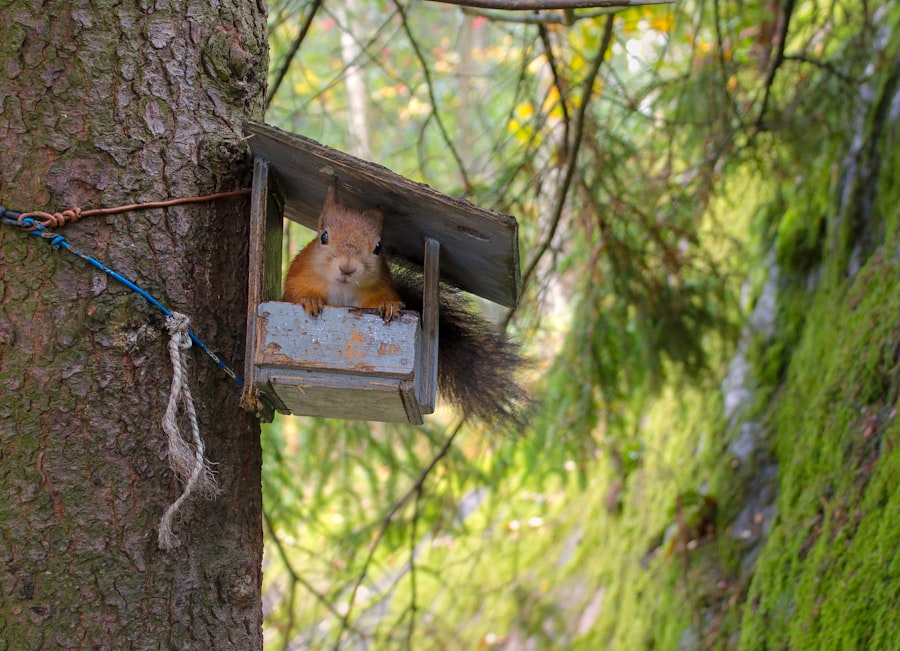
Another strategy for deterring squirrels from bird feeders and gardens is to provide alternative food sources that will distract them from the desired areas. This can include setting up feeding stations with squirrel-friendly food such as corn, nuts, and seeds in a location away from bird feeders. By providing an alternative food source, you can redirect the attention of squirrels away from bird feeders and reduce their impact on the seeds meant for birds.
Additionally, planting squirrel-friendly plants such as sunflowers or fruit trees in a designated area of your yard can provide a natural food source for squirrels that will keep them occupied and away from areas where they may cause damage. By providing alternative food sources, you can effectively manage squirrel activity on your property and reduce their impact on bird feeders and gardens.
Seeking Professional Help
If you have tried various methods to deter squirrels and quail from your property without success, it may be time to seek professional help. Pest control professionals have the knowledge and experience to effectively manage squirrel and quail activity on your property using safe and humane methods. They can assess the situation, identify the root causes of the problem, and implement targeted strategies to keep these animals at bay.
Professional pest control services may include trapping and relocating squirrels or quail, installing exclusion devices to prevent access to certain areas, or implementing habitat modification techniques to make your property less appealing to these animals. By seeking professional help, you can effectively address squirrel and quail issues on your property and protect your garden, bird feeders, and home from damage.
In conclusion, dealing with squirrels and quail on your property can be challenging, but there are effective strategies that can help deter these animals and protect your garden, bird feeders, and home. By understanding the reasons why these animals are attracted to your property and implementing targeted solutions such as physical barriers, natural repellents, squirrel-proof feeders, removing attractants, providing alternative food sources, and seeking professional help, you can effectively manage squirrel and quail activity on your property while promoting a safe and welcoming environment for birds and other wildlife.
If you’re looking for ways to keep squirrels away from your quail block, you might also be interested in learning about how to care for goslings. Our article on how to care for goslings provides valuable insights and tips for raising healthy and happy goslings. Understanding the needs of different poultry species can help you create a harmonious environment for all your feathered friends.
FAQs
What are some natural ways to keep squirrels away from quail block?
Some natural ways to keep squirrels away from quail block include using spicy deterrents such as cayenne pepper or hot sauce, planting squirrel-repelling plants like daffodils or marigolds, and using predator urine or hair from predators like foxes or coyotes.
Are there any commercial products available to keep squirrels away from quail block?
Yes, there are commercial products available such as squirrel-proof bird feeders, motion-activated sprinklers, and ultrasonic repellent devices that emit high-frequency sounds to deter squirrels.
What are some physical barriers that can be used to keep squirrels away from quail block?
Physical barriers such as wire mesh or hardware cloth can be used to cover the quail block and prevent squirrels from accessing it. Additionally, placing the quail block on a platform or feeder that is difficult for squirrels to access can also be effective.
Is it safe to use chemical deterrents to keep squirrels away from quail block?
It is not recommended to use chemical deterrents to keep squirrels away from quail block, as these can be harmful to both the squirrels and the quail. It is best to use natural or physical methods to deter squirrels.
Meet Walter, the feathered-friend fanatic of Florida! Nestled in the sunshine state, Walter struts through life with his feathered companions, clucking his way to happiness. With a coop that’s fancier than a five-star hotel, he’s the Don Juan of the chicken world. When he’s not teaching his hens to do the cha-cha, you’ll find him in a heated debate with his prized rooster, Sir Clucks-a-Lot. Walter’s poultry passion is no yolk; he’s the sunny-side-up guy you never knew you needed in your flock of friends!

